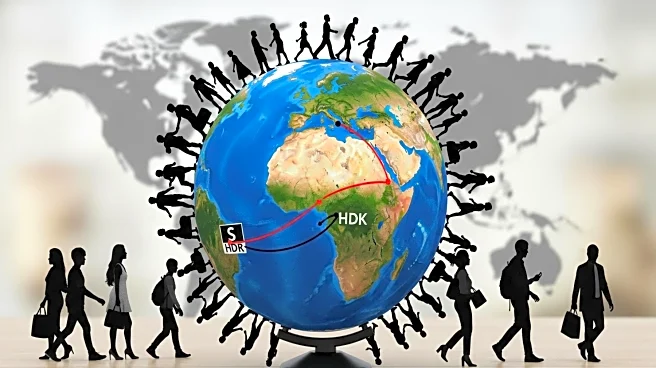What's Happening?
The U.S. has been deporting third-country immigrants to various African nations, including Ghana, Eswatini, Rwanda, and South Sudan. This controversial program has faced criticism for potentially violating international human rights laws. Recently, 14 deportees, including 13 Nigerians and one Gambian, were sent to Ghana, despite having no ties to the country. Ghana accepted these individuals on humanitarian grounds, although the deportees' lawyers argue that the deportations contravene international protections for asylum-seekers. The Trump administration's deportation strategy has been criticized for its lack of transparency and potential human rights violations, as some deportees face the risk of torture if returned to their home countries.
Why It's Important?
The deportation of third-country immigrants to African nations raises significant human rights concerns and questions about the legality of such actions under international law. The program has been criticized for its potential to undermine the rights of asylum-seekers and for the conditions under which deportees are transported and detained. This situation highlights the broader implications of U.S. immigration policies on international relations and human rights standards. African nations participating in these agreements may be seeking to improve diplomatic relations with the U.S., but they also face scrutiny over their human rights records.
What's Next?
The ongoing deportation program is likely to face continued legal challenges and international criticism. Human rights organizations and legal experts may push for greater accountability and transparency in the deportation process. The U.S. government may need to address these concerns to avoid further damage to its international reputation. Additionally, African nations involved in these agreements may face pressure to ensure the humane treatment of deportees and to uphold international human rights standards.
Beyond the Headlines
The deportation program reflects broader geopolitical dynamics, where countries may engage in controversial agreements to gain favor with powerful nations like the U.S. This situation also underscores the ethical dilemmas faced by countries balancing humanitarian principles with political and economic interests. The treatment of deportees and the conditions they face highlight ongoing challenges in global migration and the protection of vulnerable populations.










